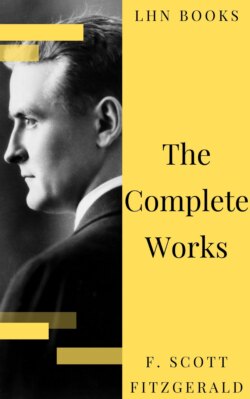Читать книгу The Complete Works of F. Scott Fitzgerald - F. Scott Fitzgerald - Страница 200
На сайте Литреса книга снята с продажи.
V
ОглавлениеAll night Val didn’t sleep—not because there was any question in his mind as to what he should do, but because his long stupefied emotions were suddenly awake and alive. Of course he must not see her—not he, a poor failure with a name that was now only a shadow—but it would make him a little happier always to know that she remembered. It gave his own memory another dimension, raised it like those stereopticon glasses that bring out a picture from the flat paper. It made him sure that he had not deceived himself—he had been charming once upon a time to a lovely woman, and she did not forget.
An hour before train time next day he was at the railway station with his grip, so as to avoid any chance encounter in the street. He found himself a place in a third-class carriage of the waiting train.
Somehow as he sat there he felt differently about life—a sort of hope, faint and illusory, that he hadn’t felt twenty-four hours before. Perhaps there was some way in these next few years in which he could make it possible to meet her once again—if he worked hard, threw himself passionately into whatever was at hand. He knew of at least two Russians in Cannes who had started over again with nothing except good manners and ingenuity and were now doing surprisingly well. The blood of Morris Hasylton began to throb a little in Val’s temples and made him remember something he had never before cared to remember—that Morris Hasylton, who had built his daughter a palace in St. Petersburg, had also started from nothing at all.
Simultaneously another emotion possessed him, less strange, less dynamic but equally American—the emotion of curiosity. In case he did—well, in case life should ever make it possible for him to seek her out, he should at least know her name.
He jumped to his feet, fumbled excitedly at the carriage handle and jumped from the train. Tossing his valise into the check room he started at a run for the American consulate.
“A yacht came in this morning,” he said hurriedly to a clerk, “an American yacht—the Privateer. I want to know who owns it.”
“Just a minute,” said the clerk, looking at him oddly. “I’ll try to find out.”
After what seemed to Val an interminable time he returned.
“Why, just a minute,” he repeated hesitantly. “We’re—it seems we’re finding out.”
“Did the yacht come?”
“Oh, yes—it’s here all right. At least I think so. If you’ll just wait in that chair.”
After another ten minutes Val looked impatiently at his watch. If they didn’t hurry he’d probably miss his train. He made a nervous movement as if to get up from his chair.
“Please sit still,” said the clerk, glancing at him quickly from his desk. “I ask you. Just sit down in that chair.”
Val stared at him. How could it possibly matter to the clerk whether or not he waited?
“I’ll miss my train,” he said impatiently. “I’m sorry to have given you all this bother——”
“Please sit still! We’re glad to get it off our hands. You see, we’ve been waiting for your inquiry for—ah—three years.”
Val jumped to his feet and jammed his hat on his head.
“Why didn’t you tell me that?” he demanded angrily.
“Because we had to get word to our—our client. Please don’t go! It’s—ah, it’s too late.”
Val turned. Someone slim and radiant with dark frightened eyes was standing behind him, framed against the sunshine of the doorway.
“Why——”
Val’s lips parted, but no words came through. She took a step toward him.
“I——” She looked at him helplessly, her eyes filling with tears. “I just wanted to say hello,” she murmured. “I’ve come back for three years just because I wanted to say hello.”
Still Val was silent.
“You might answer,” she said impatiently. “You might answer when I’d—when I’d just about begun to think you’d been killed in the war.” She turned to the clerk. “Please introduce us!” she cried. “You see, I can’t say hello to him when we don’t even know each other’s names.”
It’s the thing to distrust these international marriages, of course. It’s an American tradition that they always turn out badly, and we are accustomed to such headlines as: “Would Trade Coronet for True American Love, Says Duchess,” and “Claims Count Mendicant Tortured Toledo Wife.” The other sort of headlines are never printed, for who would want to read: “Castle is Love Nest, Asserts Former Georgia Belle,” or “Duke and Packer’s Daughter Celebrate Golden Honeymoon.”
So far there have been no headlines at all about the young Rostoffs. Prince Val is much too absorbed in that string of moon-light-blue taxi-cabs which he manipulates with such unusual efficiency, to give out interviews. He and his wife only leave New York once a year—but there is still a boatman who rejoices when the Privateer steams into Cannes harbor on a mid-April night.
— ◆ —
